What does Supreme Court nominee Brett Kavanaugh mean for LGBT rights?
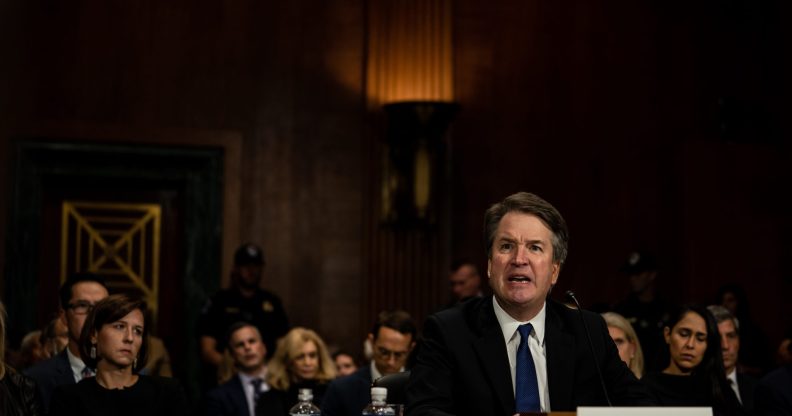
SEPTEMBER 27 – WASHINGTON, DC: Judge Brett M. Kavanaugh testified in front of the Senate Judiciary committee regarding sexual assault allegations at the Dirksen Senate Office Building on Capitol Hill Thursday, September 27, 2018. at a Senate Judiciary Committee hearing on September 27, 2018 on Capitol Hill. Blasey Ford, a professor at Palo Alto University and a research psychologist at the Stanford University School of Medicine, has accused Supreme Court nominee Brett Kavanaugh of sexually assaulting her during a party in 1982 when they were high school students in suburban Maryland. (Photo by Erin Schaff-Pool/Getty Images)
In an extraordinary hearing on Thursday (September 27), US President Donald Trump’s Supreme Court nominee Brett Kavanaugh vehemently denied an emotional testimony from Christine Blasey Ford, a university professor who accused the Republican of sexually assaulting her when they were both in high school.
If elected to the Supreme Court, a lifelong position, Kavanaugh could tip the balance in favour of conservatives—on issues including LGBT+ rights and abortion—for decades to come. The civil rights of American citizens, over which the country’s highest court has the final say, could be at stake.
The dramatic scenes at the Senate Judiciary Committee hearing on Capitol Hill, Washington DC, were watched by millions across the world, with many praising Ford—her voice breaking at times as she delivered her testimony—for having the courage to tell her story publicly.
Ford is one of three women to accuse Kavanaugh of sexual misconduct. “Brett’s assault on me drastically altered my life. For a very long time, I was too afraid and ashamed to tell anyone the details,” the academic told senators.
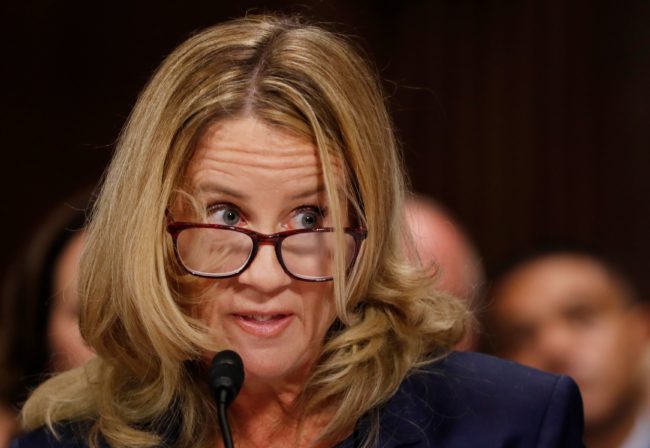
Ford at Thursday’s hearing. (JIM BOURG/AFP/Getty)
In contrast, Kavanaugh, who described the hearing as a “national disgrace,” was angry and impassioned—at times appearing close to tears and, in other moments, like the 17-year old schoolboy he so fiercely strived to defend.
The case has divided US media, with The New York Times describing Ford as “calm and dignified, [while] Brett Kavanaugh was volatile and belligerent.” The Wall Street Journal, however, chastised the hearing as “an embarrassment that should have never happened.” Trump, too, backed Kavanaugh on Twitter, describing his testimony as “powerful, honest, and riveting.”
With Republicans calling Senate judiciary committee to vote on the 53-year old judge’s nomination on Friday (September 28), the outcome is set to be revealed next week.
Why has Kavanaugh been nominated to the Supreme Court?
In July, Trump chose Kavanaugh, a US court of appeals judge, as his preferred choice to become associate justice on the Supreme Court.
The position has been vacant since former associate justice Anthony Kennedy, who was pivotal in voting through a number of gay rights laws, including equal marriage, stepped down in July.
There are nine Supreme Court justices, who have the last say on US law. Liberals are worried that, if Kavanaugh is nominated to the court, he could be key to stopping a majority vote on issues protecting or furthering civil rights.
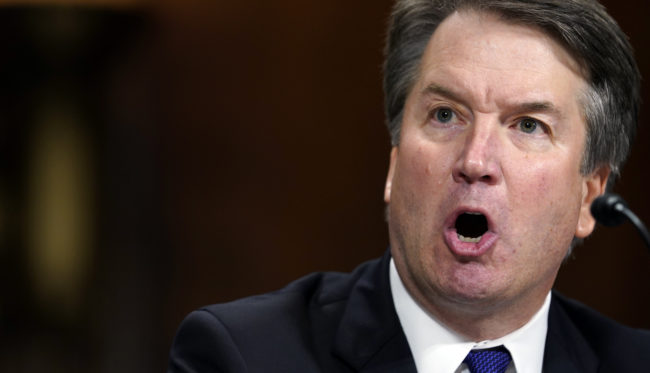
Kavanaugh was visibly angry during Thursday’s hearing. (Andrew Harnik-Pool/Getty)
What are Kavanaugh’s views on LGBT+ rights?
Kavanaugh has remained tight-lipped over his views on LGBT+ issues and he has no judicial record on gay rights cases.
Kavanaugh was serving as a staff secretary at the White House in 2006 when the then-president George Bush was seeking a constitutional amendment to ban same-sex marriage, but no documents have been released from this time.
However, during Kavanaugh’s confirmation hearing on September 6, the Supreme Court nominee refused to say what his opinion is of equal marriage. His behaviour was condemned by Human Rights Campaign president Chad Griffin, who said: “Brett Kavanaugh’s refusal to answer very basic, very direct questions about the Supreme Court’s historic ruling bringing marriage equality nationwide is alarming and completely unacceptable.”
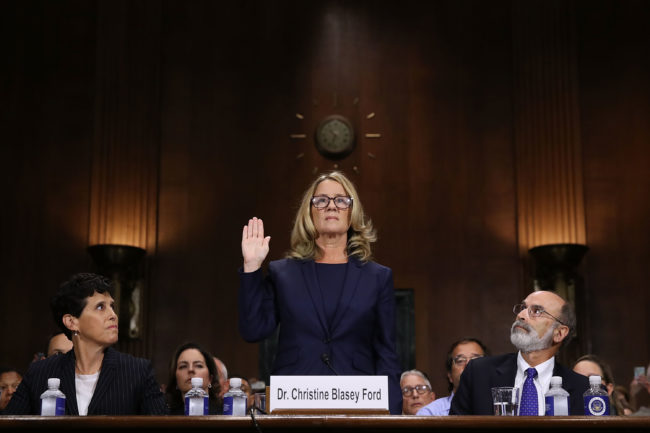
Ford swears under oath at the Senate Judiciary Committee hearing. (Win McNamee/Getty)
Other LGBT+ groups have criticised Trump’s choice to fill the Supreme Court role, saying Kavanaugh would be a backwards step for gay rights.
Sarah Kate Ellis, president and CEO of GLAAD, said in July: “If confirmed, Brett Kavanaugh will have the chance to codify President Trump and Vice President Pence’s dangerous anti-LGBTQ record and the agenda of anti-LGBTQ groups into law for decades to come.”
Could Kavanaugh reverse abortion?
Kavanaugh has previously said he would uphold the Supreme Court’s landmark ruling on Roe v. Wade in 1973, which effectively legalised abortion across the US.
In 2006, Kavanaugh was pressed about his own views on abortion during a hearing consider a nomination for him to be appointed to the DC Circuit, saying: “I don’t think it would be appropriate for me to give a personal view on that case.”
But, he added: “If confirmed to the DC Circuit, I would follow Roe v. Wade faithfully and fully. That would be binding precedent of the court. It has been decided by the Supreme Court.”
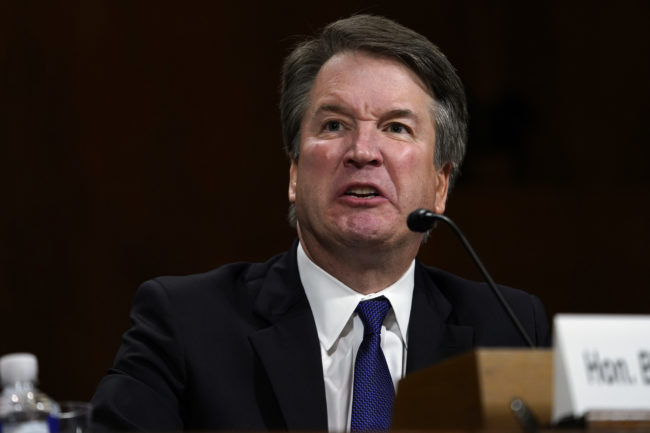
Kavanaugh has strongly denied all claims of sexual misconduct. (Andrew Harnik/Getty)
Still, feminists are concerned that Kavanaugh could overturn the Supreme Court’s ruling on abortion, which it has the power to do, following his actions in a DC Circuit case last year. Kavanaugh dissented from a DC Circuit ruling in October 2017, which stated that an undocumented teenage immigrant was allowed to have an abortion.
Kavanaugh wrote in his dissent that the Supreme Court has held that “the government has permissible interests in favouring foetal life, protecting the best interests of a minor, and refraining from facilitating abortion.” He added that America’s highest court has “held that the government may further those interests so long as it does not impose an undue burden on a woman seeking an abortion.” Former associate justice, Kennedy, on the other hand, was a swing vote in favour of abortion rights.
Women’s rights groups fear that, if Kavanaugh fills this key role, he could be pivotal in any decisions on abortion presented to the Supreme Court. This is combined with Trump stating he was against abortion—except in exceptional circumstances—during the 2016 presidential campaign, saying he would be minded to appoint pro-life justices at the Supreme Court, while vice-president Mike Pence is notoriously anti-abortion, and even pledged to end legal abortion “in our time” in March.

